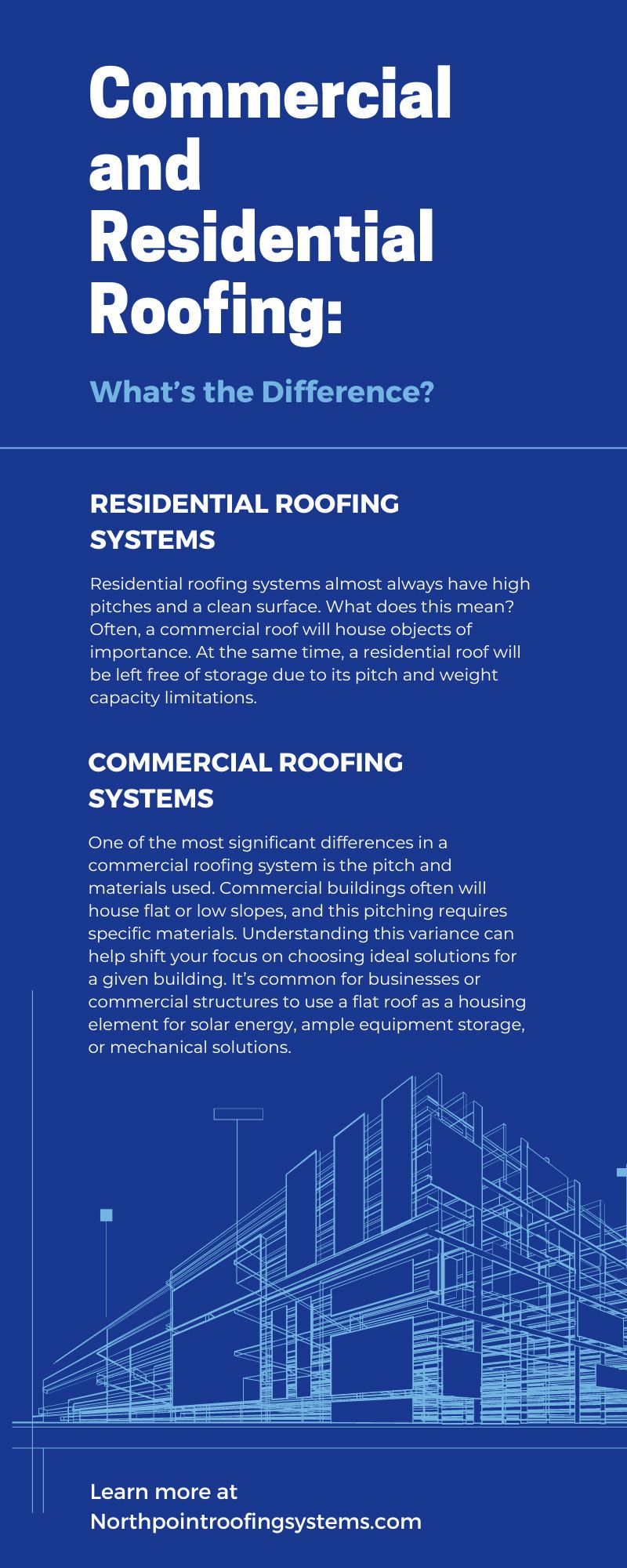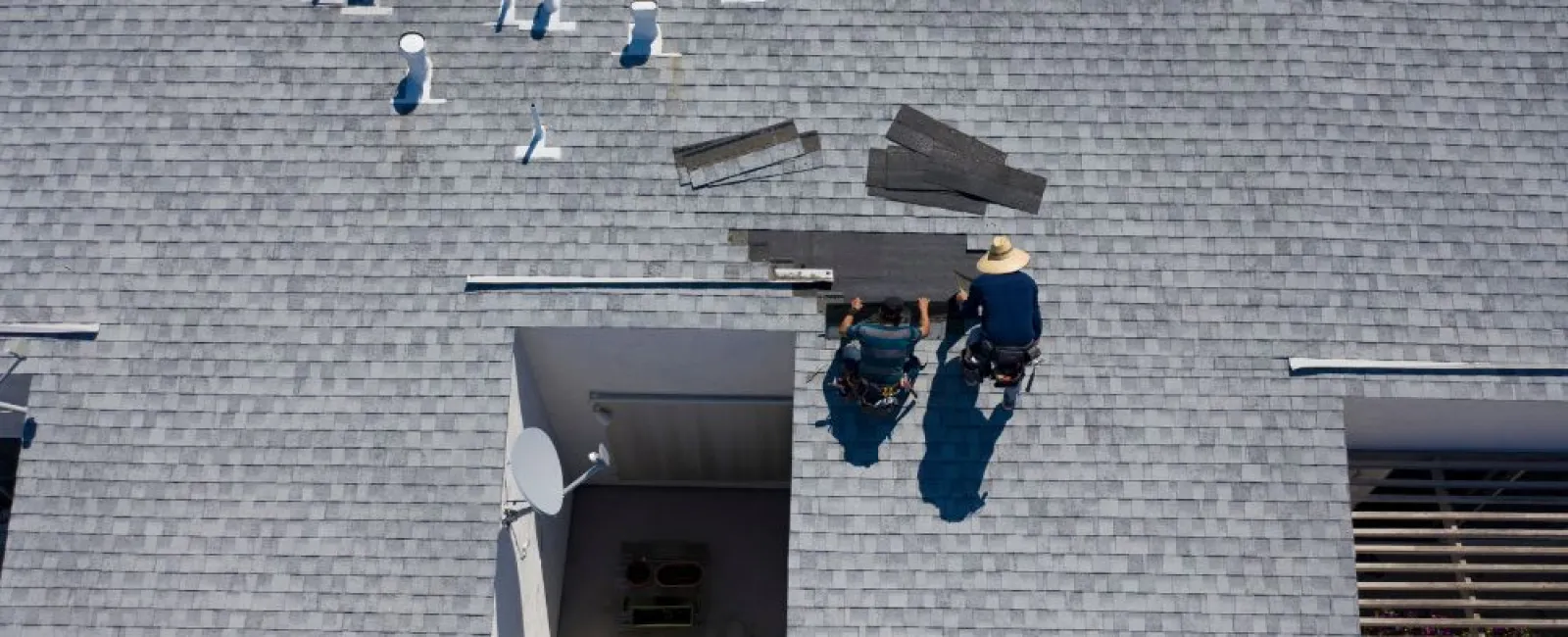There are many differences between commercial and residential roofing systems. While this may seem obvious, many will fall victim to poor customer experience and financial greed without a basic understanding of what to look for and who to hire. We uncover the fundamental differences between the two here so you can align yourself with the most appropriate option. This will help you ensure your investment withstands the test of time, weather, and performance demands.
Residential Roofing Systems
Residential roofing systems almost always have high pitches and a clean surface. What does this mean? Often, a commercial roof will house objects of importance. At the same time, a residential roof will be left free of storage due to its pitch and weight capacity limitations. Usually, the only exception to this rule is solar energy panels on a residential roof, as the top is the prime location.
Various elements separate residential roofs from commercial roofs, including cost, materials, and general upkeep demands. The primary objectives for any roofing system are the same, but the details of how we get there will vary to provide optimal performance and long-term reliability.
Commercial Roofing Systems
One of the most significant differences in a commercial roofing system is the pitch and materials used. Commercial buildings often will house flat or low slopes, and this pitching requires specific materials. Understanding this variance can help shift your focus on choosing ideal solutions for a given building.
Regardless of industrial demands and applications, there are several advantages for commercial roofing systems to be flat or have low slopes. It's common for businesses or commercial structures to use a flat roof as a housing element for solar energy, ample equipment storage, or mechanical solutions. It's also common for commercial roofing solutions to house gardens and sustainable supplies for those using the structure.
A key determinant in how well a commercial roofing space accommodates an industry is the weight capacity limitations and considerations. For example, a roof with a low slope would not suit equipment storage or gardening, but it could house solar paneling.
Material Selections
To compare side by side, let's dive into the material selection process for both roofing systems. The materials used in commercial and residential roofs are drastically different because the weight capacities and general uses are different.
For residential roofs, it's common for asphalt shingles to reign supreme. These shingles are accessible roofing materials regarding installations and cost-effectiveness. It's not uncommon to find tile, ceramic, slate, metal paneling, or wood shaking on a residential roof, though these are often for custom builds. The decking is generally a wooden construction comprised of rafters and plywood; an underlay goes on before the roofing material to ensure protection and support.
A commercial roof differs because of the pitch variances. The materials used for residential roofs do not make feasible candidates for commercial structures, and installers gravitate to options such as gravel, tar, spray-on polyurethane foam, or single-ply solutions.
These materials possess increased durability and optimal performance on flat tops or low pitching. Depending on the exact materials used, the layers will also vary. Generally, you can expect a combination of decking, insulation, and reflective or protective coatings.
Installation Process and Repair Services
Now we know the material selection process is variable based on design and structural demands. It's relatively easy to understand that the installation and repair processes will also be individual to a given roofing system.
Generally, the sizing demands for each roofing system can impact these processes. Commercial roofs require an extensive installation process because of their grand sizes. In contrast, a residential roof will take far less time to install, with some systems finishing in as little as a day or two.
Repair services can also become quite cumbersome because of the layering that creates the complete roof system and how the damages may affect all involved materials. An example of variable repair outcomes is a leaking issue. When residential roofs leak, it's typically isolated and solvable by correcting the shingles or flashing. This may only take a few hours to complete, pending the severity. A commercial roof leak can become quite extensive and involve a patchwork of a designated area or a total rework of the layering.
Financial Differences
The financial differences undeniably set the two systems apart from one another. Asphalt residential shingles remain an industry-leading, cost-effective solution. However, various other materials are available, and they have their pros and cons.
A commercial building requires increased financial means due to the extensive groundwork, size, and design elements, though they generally withstand long-term conditions and can handle much greater weight capacities. Upfront commercial roofs are more expensive. However, when evaluating long-term performance demands, commercial buildings offer more flexibility.
Given the material and design differences, the tools necessary to complete roofing projects will weigh labor costs and job completion. A general commercial roofing project may require heat tools, welding equipment, and any associated personal protection gear that corresponds with the related tools. It's critical to factor in the labor demands and that the teams necessary to perform these jobs will obtain and possess different skill sets.
Choosing the Right Roofing for Your Needs
When we peel apart the core differences of commercial vs residential roofing systems, it's easy to see that choosing the proper setup is critical and financially advantageous. The first step in ensuring this process goes as intended is hiring a reputable company in roofing systems and solutions. These professionals can directly understand your distinct needs and help you refine your material selection process.
Additionally, a reputable roofing company will help align you with a solution for long-term performance needs, environmental demands, existing structural supports, and cost-effectiveness for solutions. Where one company may argue asphalt shingles are best, another may say a metal roof is beneficial in the long run. Hiring right can help you define these differences and ensure you install the most appropriate commercial or residential roofing system.
The Northpoint Way
At Northpoint Roofing Systems, we deliver unique solutions to our customers with integrity, handcrafted skill sets, and a solution-oriented focus. Our professional team delivers high-quality workmanship in every residential and commercial roofing system to ensure long-term reliability and excellent customer service. Partner with us today for new construction, existing installations, and prompt repairs. Get started by scheduling a roof inspection today!


